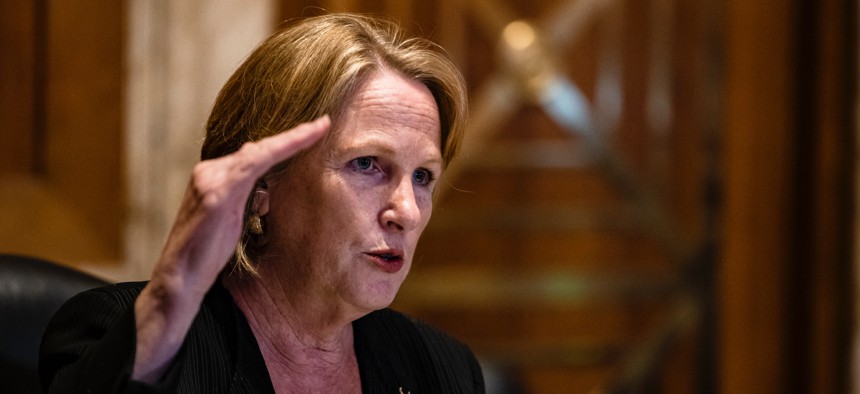IRS Taxpayer Advocate Says Congress Shortchanged IT Modernization Efforts

Erin Collins, national taxpayer advocate at the Taxpayer Advocate Service, said in a March 16 blog that Congress needs to direct more funding toward IRS IT modernization projects. Pool / Getty Images
Lawmakers didn’t allocate the $80 billion provided to the IRS in the right way, claims National Taxpayer Advocate Erin Collins, adding that IT modernization and taxpayer services aren’t getting the money they need.
Despite giving the IRS nearly $80 billion in the Inflation Reduction Act, Congress only apportioned a sliver of it for IT modernization, and it’s not enough, said the National Taxpayer Advocate in a recent blog post.
The law gave the IRS an influx of cash over the next decade meant to supplement annual appropriations after years of decreasing funding for the agency.
But National Taxpayer Advocate Erin Collins writes in a March 16 blog post that of that investment, only $4.8 billion went to the IRS’ business systems modernization account. That account provides funding for planning and capital asset acquisition of IT to modernize IRS business systems, according to the agency’s 2024 budget request. That is 10% of the $80 billion, the other 90% of which went to enforcement and operations support at the IRS.
Bolstering tax enforcement for wealthy Americans and closing the tax gap of unpaid taxes was a goal touted by Democrats who backed the package, which also had health and climate provisions.
But Collins, who also calls out what she says is insufficient funding for taxpayer services, argues that “enforcement is just one component of an effective compliance strategy.”
“The most efficient way to improve compliance is by encouraging and helping taxpayers to do the right thing on the front end,” she continues. “That is much cheaper and more effective than trying to audit our way out of the tax gap one taxpayer at a time on the back end.”
Among the top tech priorities at the agency are modernizing a 60-year-old system the IRS is still operating as a key source for individual tax data. A recent report by the Government Accountability Office actually found that 23% of its software and 8% of its hardware is legacy tech.
Collins argues that Congress should reallocate funding given in the Inflation Reduction Act or give the IRS more flexibility in terms of how it can spend its enforcement money or allow it to move funding between accounts itself.
Whether lawmakers will actually take action is unclear.
House Republicans' first move as the majority in the new Congress was a vote to repeal most of the funding given to the IRS in the Inflation Reduction Act. Former IRS commissioners have already expressed anxiety that appropriators could cut the IRS budget in annual appropriations, leaving it to use the $80 billion influx for normal operations.
In the latest budget request for fiscal 2024, the IRS is asking lawmakers for $286.6 million for business systems modernization, noting that the modernization account didn’t receive funding in fiscal 2023 appropriations, according to the agency’s budget request.
Among the agenda items highlighted in the budget request for what the money would go to is an enterprise case management system to consolidate over 60 disparate systems.
The IRS writes in the budget request that “the modernization essential to support 21st century tax administration requires sustained annual discretionary funding in addition to mandatory funding,” noting that “without discretionary funding, approximately one-third of the planned modernization will need to be descoped, delayed or entirely withdrawn.”
“The IRS has had a mixed record with IT projects in the past. Congress has sometimes responded by reducing its funding. I understand the frustration, but that’s not the right answer for taxpayers or tax administration,” wrote Collins. “The reality is that whether in the public sector or the private sector, some IT projects fail. Other IT projects experience delays and cost overruns. That comes with the territory.”






